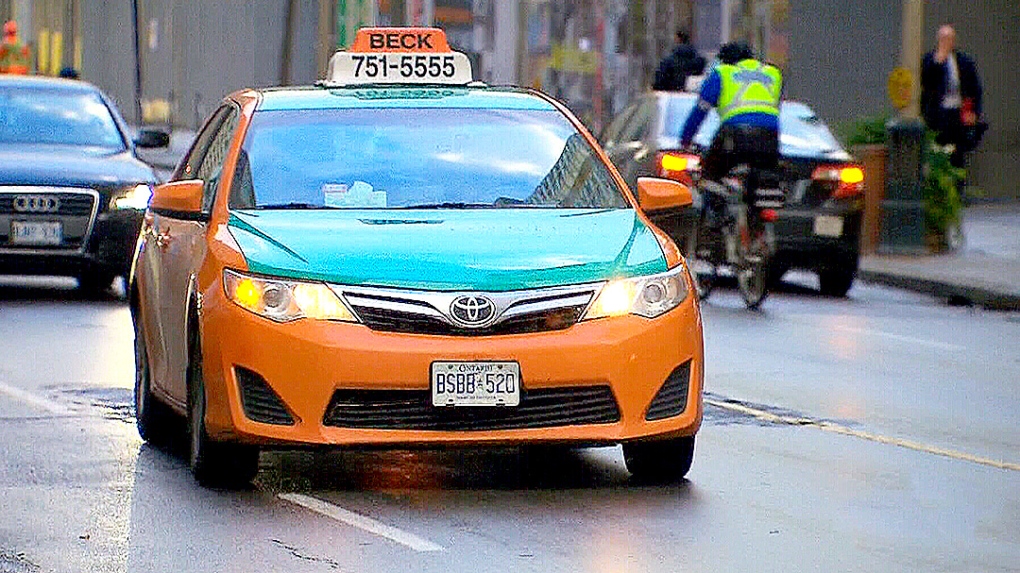'Going to kill a lot of jobs': Toronto taxi companies speak out against proposed zero-emissions legislation
 A Beck Taxi cab is seen driving in Toronto on Thursday, Nov. 19, 2015.
A Beck Taxi cab is seen driving in Toronto on Thursday, Nov. 19, 2015.
Taxi companies in the GTA are speaking out against City Hall’s intention to mandate zero-emissions taxicabs and ride shares by 2031, a move one entrepreneur says will “destroy a lot of drivers’ livelihoods.”
On Sept. 21, the Toronto City Council debated a proposal that would require most vehicles-for-hire to use zero-emissions vehicles by 2031, with a one-year grace period implemented for drivers phasing out hybrid vehicles.
- Download our app to get local alerts on your device
- Get the latest local updates right to your inbox
The policy would bring with it an extended network of electric vehicle charging infrastructure across the city, as well as one-time grants for some taxi companies to replace their fleets with approved vehicles.
Abdul Mohamoud, CEO of Co-op Cabs, a Toronto-based taxi company, says that while this legislation may “sound great,” it has the potential “to kill a lot of jobs.”
“Most drivers don’t have private driveways or charging facilities in their homes,” he said in an interview. “You can’t retrofit these buildings – the physical infrastructure isn’t there, and won’t be added to private property without a significant cost. The economics don’t work.”
Mohamoud believes the policy is especially likely to hurt drivers working for rideshare companies like Uber, which employs over 100,000 drivers across the country. Uber drivers in the Greater Toronto Area – specifically Toronto, Mississauga, Oakville, and Brampton – are already required to drive a vehicle less than seven years old, a restriction which limits low-income drivers from earning money on the app. The addition of a zero-emissions qualifier – which adds a higher sticker price for a new car – may shut out more would-be drivers from Toronto’s large gig economy.
“People cannot afford electric vehicles,” Mahamoud said. “The city can’t implement this without addressing the infrastructure, and even then, it’s a long shot. This is going to drive operators and drivers out of the business.”
Kristine Hubbard, operations manager of Beck Taxi, agrees.
“We explicitly shared our thoughts on this with the city,” she said in an interview.
According to Hubbard, the insurance needed for an electric vehicle to operate as a taxi will be nearly impossible to attain for an entire city's fleet applying simultaneously. The gap in insurance, she says, can be attributed to the relatively new enterprise of electric cars, which require a specialist for even minor repairs and upkeep.
“If thousands of Ubers and taxis all have to upgrade at the same time, there’s a waiting list that can be over two years,” she added. “It’s a disappointing policy with a horrible potential impact.”
CTVNews.ca Top Stories

Prime Minister Trudeau meets Donald Trump at Mar-a-Lago
Prime Minister Justin Trudeau landed in West Palm Beach, Fla., on Friday evening to meet with U.S.-president elect Donald Trump at Mar-a-Lago, sources confirm to CTV News.
'Mayday! Mayday! Mayday!': Details emerge in Boeing 737 incident at Montreal airport
New details suggest that there were communication issues between the pilots of a charter flight and the control tower at Montreal's Mirabel airport when a Boeing 737 made an emergency landing on Wednesday.
Hit man offered $100,000 to kill Montreal crime reporter covering his trial
Political leaders and press freedom groups on Friday were left shell-shocked after Montreal news outlet La Presse revealed that a hit man had offered $100,000 to have one of its crime reporters assassinated.
Questrade lays off undisclosed number of employees
Questrade Financial Group Inc. says it has laid off an undisclosed number of employees to better fit its business strategy.
Cucumbers sold in Ontario, other provinces recalled over possible salmonella contamination
A U.S. company is recalling cucumbers sold in Ontario and other Canadian provinces due to possible salmonella contamination.
Billboard apologizes to Taylor Swift for video snafu
Billboard put together a video of some of Swift's achievements and used a clip from Kanye West's music video for the song 'Famous.'
Musk joins Trump and family for Thanksgiving at Mar-a-Lago
Elon Musk had a seat at the family table for Thanksgiving dinner at Mar-a-Lago, joining President-elect Donald Trump, Melania Trump and their 18-year-old son.
John Herdman resigns as head coach of Toronto FC
John Herdman, embroiled in the drone-spying scandal that has dogged Canada Soccer, has resigned as coach of Toronto FC.
Weekend weather: Parts of Canada could see up to 50 centimetres of snow, wind chills of -40
Winter is less than a month away, but parts of Canada are already projected to see winter-like weather.


































